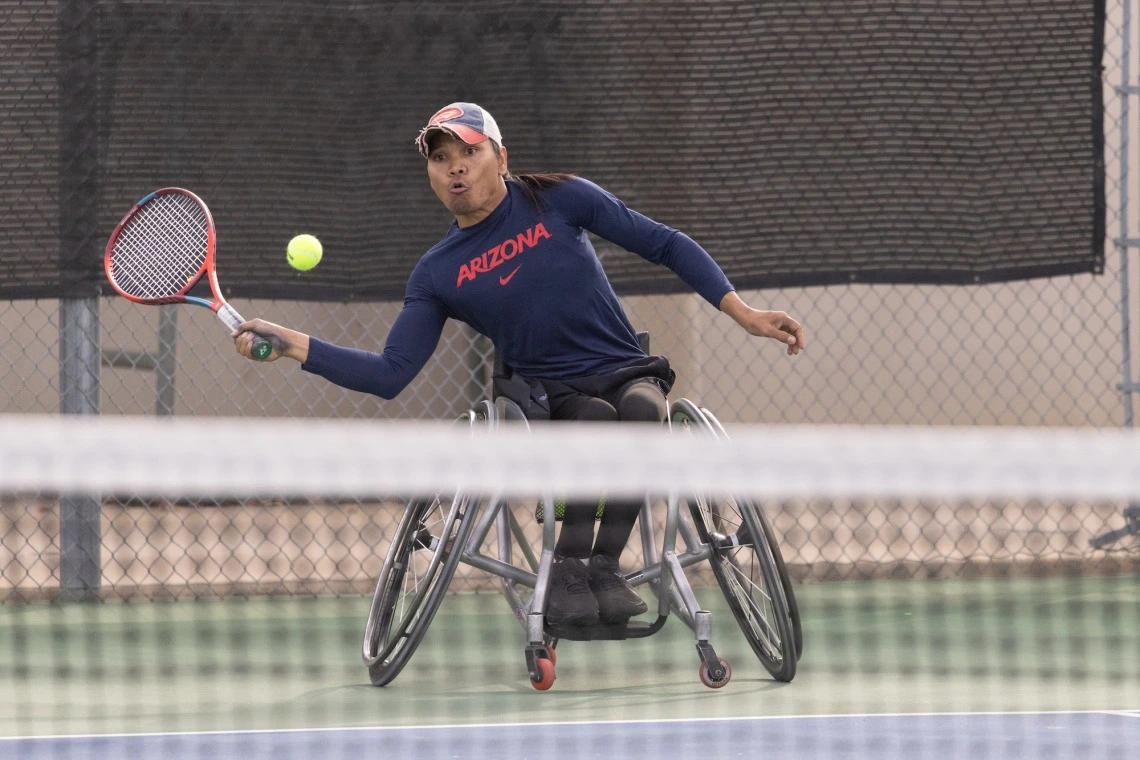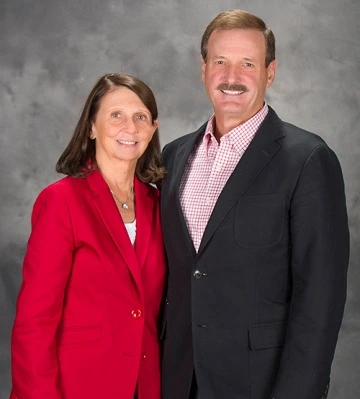$1M gift helps build equity for UArizona adaptive athletes

Den Baseda, a graduate student studying biomedical engineering, playing wheelchair tennis. A new gift from Cole and Jeannie Davis will help the UArizona Adaptive Athletics program recruit elite athletes well into the future.
Chris Richards/University of Arizona
Longtime University of Arizona supporters Cole and Jeannie Davis have committed $1 million to the university's Adaptive Athletics program to help ensure equity for disabled student-athletes and expand access to resources for student support and career readiness.
Adaptive Athletics, celebrating its 50th anniversary this year, is part of the campus Disability Resource Center. A total of 63 disabled student-athletes compete in various sports, from wheelchair basketball, tennis and rugby to adaptive golf and track and field. Among its alumni are more than 50 Paralympians representing the United States, Canada, Australia and other nations.

Cole and Jeannie Davis
"This transformative gift is a testament to the ongoing excellence of our Adaptive Athletics program and the important role it plays in the lives of disabled student-athletes. The Davises are such incredible supporters of the University, and I am so grateful for this gift, which will enhance the student experience and help prepare these talented young people for competition and life after college," said University of Arizona President Robert C. Robbins.
The Davis gift follows a gift from Jim and Vicki Click, longtime supporters of Adaptive Athletics, who committed $6.5 million to the program in 2023. Both gifts will allow the program to recruit elite athletes well into the future and reduce staff time dedicated to raising money to cover basic budgetary needs.
"The gifts are going to secure our future," said Pete Hughes, the program's athletics director. "Now, we can really focus on a quality of experience for our student-athletes, which is incredible."
The gift will pay for equipment, uniforms and travel expenses, Hughes said, and will support a more holistic student-athlete experience that includes additional services for sports nutrition, sports psychology and tutoring.
The Davises are all in. Over the years, they have provided ongoing support to Adaptive Athletics and spent time getting to know members of the men’s and women’s wheelchair basketball teams. Since their arrival in Tucson more than 20 years ago, the couple also has made commitments to Arizona Athletics, the College of Fine Arts, the University of Arizona Cancer Center, the Boys & Girls Clubs of Tucson and Casa de los Niños.
"We're hoping our gift will help them with operating expenses – to make things a little easier as far as travel and equipment," Jeannie Davis said. "We have watched how much these kids accomplish with how little they have. Some have shared stories of really hard times and, somehow, they power through. We just love watching them."
Student-athletes make up a small proportion of the disabled population at UArizona, which works with over 4,500 students to ensure an accessible campus experience. However, the student-athletes play an important role in expanding our understanding of the disability experience.
"When someone sees an amputee or somebody in a wheelchair shooting a 3-point shot when they can't make a 3-point shot themselves, it changes social perception through sport, and that's one of our program's goals," Hughes said.
Adaptive Athletics plays an important role in university inclusion, according to Amanda Kraus, assistant vice president for Campus Life and executive director of disability resources.
"The program offers an accessible gym in which students can train, and the programs provide professional coaching across a variety of sports," she said. "It also showcases the talents of our disabled student-athletes to the rest of campus through our partnerships with Arizona Athletics, Campus Recreation and the department of Sports Medicine in Campus Health."
Kraus says the DRC works toward inclusivity and equity for all its students, with a goal for disabled students, employees and visitors to have a similar if not identical experience with campus accessibility as their nondisabled peers. In addition to removing disability-related barriers, the DRC works with campus colleagues on proactive inclusive design that will reduce or eliminate the need for accommodations or modifications.
"Designing for inclusion will make our campus welcoming to all community members and ultimately provide disabled people a more equitable experience," Kraus said.
Equity for disabled student-athletes means an experience parallel to that of nondisabled student-athletes.
"We are working to provide disabled student-athletes with an experience that parallels the Intercollegiate Athletics, but we do not yet have the budget to fully support that kind of holistic experience," Kraus said. "Adaptive Athletics is so very fortunate to have the support of the Davises and other friends. Their gift is an investment not just in our program but in the individual athletes we recruit and support, who deserve the best athletics experiences."
Cole Davis agrees: "We have one of the best Adaptive Athletics programs in the country, but they lack resources compared with what you see on the other side with Arizona Athletics. With everything from uniforms to travel, they are just underfunded is the only way to put it. And hopefully, our gift will assist in some small way to create equity between the two programs."
"What's unfortunate," he said, "is that their biggest challenge after they leave school is finding a job because so many people won't hire them. We hope this gift can help."
According to Hughes, the employment rate for wheelchair users is 18%. Add in a bachelor's degree, and it goes to 23%, which Hughes said, is "still very low."
When the person has competed in sports, the number goes up to 53%, Hughes said, citing a study by Mike Cottingham, an associate professor of sport administration in the Department of Health and Human Performance at the University of Houston.
"Why is there such a huge jump?" Hughes asked. He attributes the success to goal setting, time management skills involved with sports, and the ability to deal with failure and deal with success. "The lessons you learn through sports can be applied frequently to everyday life," he said.
The Davis gift will add additional support by providing funding for tutors and programs that support a holistic student-athlete experience and personal development, Hughes said.
"It's exciting to see the determination and progress of student-athletes. It's important for prospective student-athletes and recruits to see how they balance school with sport and how much they can achieve in our program," Kraus said.
"I am grateful for the ongoing support of Cole and Jeannie Davis," said John-Paul Roczniak, president and CEO of the University of Arizona Foundation. "As longtime donors, they have been incredibly generous in support of students and harnessing their leadership talents through sports. This new gift will help ensure the legacy of our Adaptive Athletics program for years to come."
On April 5, Adaptive Athletics celebrated its 50th anniversary at a fundraising gala, which raised more than $130,000 for the benefit of student-athletes competing for Adaptive Athletics.
The Davis gift is part of the Fuel Wonder campaign, the university’s $3 billion fundraising effort. Gifts already made to the campaign are giving every student access to a cohesive ecosystem of support, powering new insights into the human immunome, and transforming research in areas including cancer, engineering, space sciences and the humanities.
Learn more about Fuel Wonder by visiting the campaign's website.

